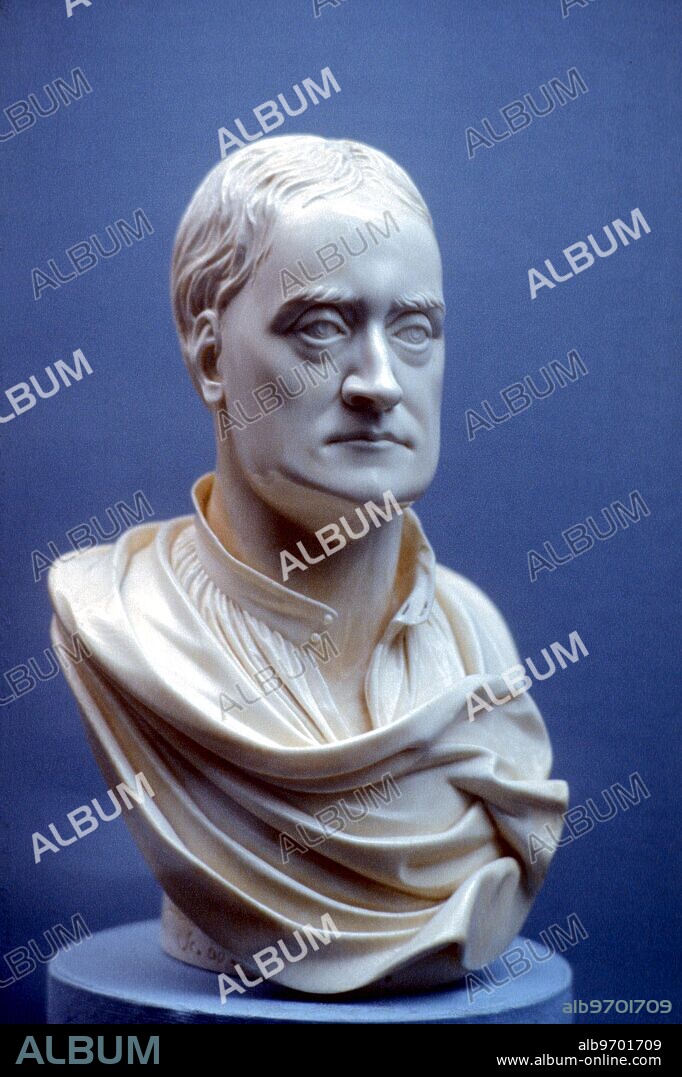alb9701709
Sir Isaac Newton 1642-1727 (ivory bust carved by David Le Marchand from life in 1718. British Museum. English physicist and mathematician who laid the foundations of physics as a modern discipline. He discovered the law of gravity, created calculus, discovered that white light is composed of many colours, and developed the three standard laws of motion still in use today. During 1665-66 he discovered the binomial theorem, and differential and integral calculus, and also began to investigate the phenomenon of gravitation. In 1685, he expounded his universal law of gravitation. His Philosophiae naturalis principia mathematica, usually referred to as Principia, was published in 1687, with the aid of Edmund Halley. Born at Woolsthorpe, Lincolnshire, he was educated at Grantham grammar school and Trinity College, Cambridge, of which he became a Fellow in 1667. He was elected a Fellow of the Royal Society in 1672, and soon afterwards published his New Theory about Light and Colours. De Motu corporum in gyrum/On the motion of bodies in orbit was wirtten in 1684. Newton resisted James II's attacks on the liberties of the universities, and sat in the parliaments of 1689 and 1701/2 as a Whig. Appointed warden of the Royal Mint in 1696, he carried through a reform of the coinage. He was elected president of the Royal Society in 1703, and was knighted in 1705. Most of the last 30 years of his life were taken up by studies of theology and chronology, and experiemnts in alchemy. He was buried in Westminster Abbey.

|
Add to another lightbox |
|
Add to another lightbox |



Buy this image.
Select the use:

Caption:
Sir Isaac Newton 1642-1727 (ivory bust carved by David Le Marchand from life in 1718. British Museum. English physicist and mathematician who laid the foundations of physics as a modern discipline. He discovered the law of gravity, created calculus, discovered that white light is composed of many colours, and developed the three standard laws of motion still in use today. During 1665-66 he discovered the binomial theorem, and differential and integral calculus, and also began to investigate the phenomenon of gravitation. In 1685, he expounded his universal law of gravitation. His Philosophiae naturalis principia mathematica, usually referred to as Principia, was published in 1687, with the aid of Edmund Halley. Born at Woolsthorpe, Lincolnshire, he was educated at Grantham grammar school and Trinity College, Cambridge, of which he became a Fellow in 1667. He was elected a Fellow of the Royal Society in 1672, and soon afterwards published his New Theory about Light and Colours. De Motu corporum in gyrum/On the motion of bodies in orbit was wirtten in 1684. Newton resisted James II's attacks on the liberties of the universities, and sat in the parliaments of 1689 and 1701/2 as a Whig. Appointed warden of the Royal Mint in 1696, he carried through a reform of the coinage. He was elected president of the Royal Society in 1703, and was knighted in 1705. Most of the last 30 years of his life were taken up by studies of theology and chronology, and experiemnts in alchemy. He was buried in Westminster Abbey.
Credit:
Album / Tom Hanley / TopFoto
Releases:
Image size:
2064 x 3100 px | 18.3 MB
Print size:
17.5 x 26.2 cm | 6.9 x 10.3 in (300 dpi)
Keywords:
ALCHEMY • ALCHEMY, ALCHEMIST • BUST (SCULPTURE) • BUST • CALCULUS • CHRONOLOGY • GRAVITATION • GRAVITY • GREAT BRITAIN • HERM, BUST • IMAGE • IVORY • MATHEMATICISN • PHYSICIST • PORTRAIT • SAVANT • SCIENTIFIC • SCIENTIST • SCULPTURE • THEOLOGIAN • THEORIST • WHIG
 Pinterest
Pinterest Twitter
Twitter Facebook
Facebook Copy link
Copy link Email
Email
